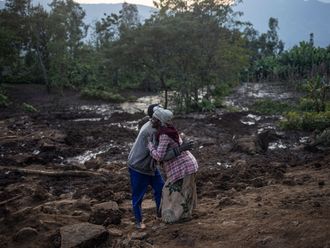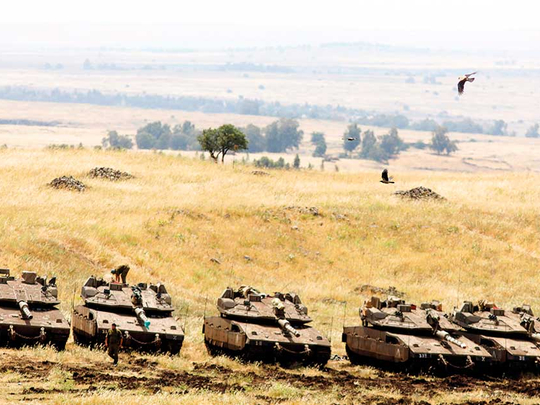
Dubai: Israel said it attacked nearly all of Iran’s military infrastructure in Syria on Thursday after it said that Iranian forces fired rockets at Israeli-held territory for the first time.
It was the heaviest Israeli barrage in Syria since the start in 2011 of its war, in which Iranians, allied Shiite militias and Russian troops have deployed in support of President Bashar Al Assad.
The Syrian Army Command said Israel’s attack killed three people and injured two others.
A Britain-based war monitor, the Syrian Observatory for Human Rights, said the strikes killed at least 23 military personnel, including Syrians and non-Syrians.
Israel said it attacked Iranian intelligence facilities and logistics compounds, a military base and other posts, as well as munition storage warehouses of the Quds forces at Damascus international airport.
It also attacked Syrian anti-aircraft batteries after they entered the fray.
While Israel has struck Syria dozens of times during the course of its seven-year civil war, this is by far the largest attack.
Israel used 28 warplanes and fired about 60 missiles in the strike, according to the Russian Defence Ministry.
Iran-Israel tensions in Syria escalate
■ The Israeli military bombed dozens of Iran-linked military facilities in Syria marking a sharp escalation in tensions. The attacks followed a wave of overnight missile strikes believed to be Iranian directed at the Israeli-occupied Golan Heights.
In addition, Israel launched more than 10 surface-to-surface tactical missiles on Syria, it said.
Israeli Defence Minister Avigdor Lieberman moved quickly to calm concerns that the major escalation was the opening salvo in a wider war saying Israel had no further desire to escalate.
However, Syria’s foreign ministry said Thursday that a salvo of Israeli strikes on its territory overnight marked a “new phase” in the country’s seven-year conflict.
- Khalid Bin Ahmad | Bahrain FM
In a statement carried by state news agency SANA, it said Israel’s “direct confrontation... signals the start of a new phase of the war on Syria”.
Washington Thursday condemned Iran for rocket fire targeting Israeli forces in the occupied Golan Heights, and voiced its “strong support” for Israel’s right to self-defense.
- White House statement
Speaking to Gulf News Anoushiravan Ehteshami, a professor of Arab studies at Durham University, said the latest attacks marked a sharp and serious escalation in the conflict.
“Israel is not going to allow Iran to gain a foothold in Syria. I think Syria will become the new frontier for regional tensions to unfold,” he said.
There is also a danger the conflict will spill over into other countries—namely Lebanon—where the Iran-backed Hezbollah group could also respond to Israeli aggression, he explained.
“Observers can only hope Iran and Israel work to reduce tensions because the conflict can easily get out of hand and currently there is no mechanism, regionally or internationally for containing this.”
- Boris Johnson | UK foreign secretary
Mohammad Abbas Naji, an editor of the monthly journal, Mukhtarat Irania, published by the Al Ahram Centre for Political & Strategic Studies, also expressed concern over the escalation.
“Israel will not allow Iran to increase its influence in Syria and seems to be taking advantage of the recent American pressure on Iran,” he said pointing to US President Donald Trump’s decision to pull out of the nuclear agreement with Iran on Tuesday.
“I predict there will be a proxy war in the region and further skirmishes between Iran and Israel in Syria but I do not think there will be a direct war between Israel and Iran,” he told Gulf News.
Speaking about the US role, Riad Kahwaji. INEGMA’s Founder & Chief Executive Officer, told Gulf News the new administration is willing to respond decisively to any Iranian aggression towards American targets.
- Angela Merkel | German Chancellor
He also does not believe Russia, Syria’s chief ally along with Iran, will get involved in the current Iranian-Israeli attacks, pointing to the fact that Israel had informed Russia of its plan to attack.
Russia is the major power broker in Syria, where its military intervention turned the tide in favour of government forces, and Israel coordinates military action there with Moscow.
While Israel has repeatedly clashed with Hezbollah, an Iranian-backed Lebanese militia, it was the first time Israel had directly accused Iran of firing toward Israeli-held territory.
It was also a rare acknowledgement of an Israeli assault.
Meanwhile, Iran denied it had attacked the Israeli-occupied Golan.
- French Foreign Ministry
In February, Iran denied a similar Israeli claim that Tehran sent an armed drone from Syria into Israeli territory, where it was shot down.
Frictions between Iran and Israel have escalated in recent months as the war in Syria winds down and parties to the conflict consolidate gains.
Iran is institutionalising its military presence there, to the distress of Israel, which has vowed to block the establishment of a permanent Iranian foothold.
-With inputs from agencies


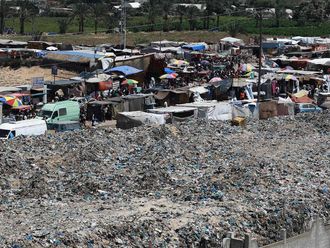



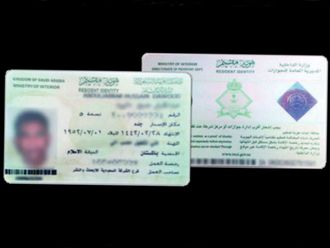

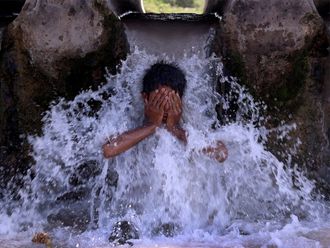

_resources1_16a30b3523c_small.jpg)
